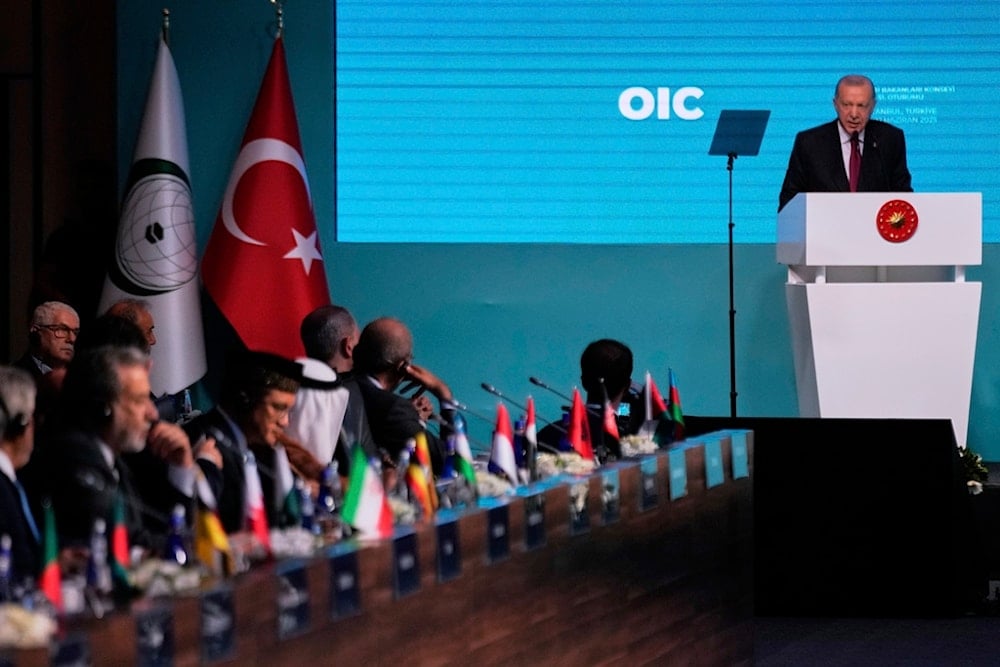Arab, Islamic states unite over Israeli attack on Qatar, ignore Gaza
Arab and Islamic ministers in Doha affirmed Qatar’s security before a summit on "Israel’s" attack, pledging solidarity and preparing a statement on the strike.
-

Turkey's President Recep Tayyip Erdogan gives an opening speech during the Council of Foreign Ministers of the Organization of Islamic Cooperation meeting, in Istanbul, Turkey, Saturday, June 21, 2025. (AP)
Arab and Islamic foreign ministers on Sunday declared that Qatar’s security is “an integral part of Arab and Islamic national security,” during a closed-door meeting in Doha ahead of an extraordinary Arab-Islamic summit set for Monday to address the Israeli assault on Qatar.
According to participants, the ministers stressed that the Israeli strike on Doha represented a breach of international law and a dangerous escalation threatening Arab, regional, and international stability.
Qatar’s Foreign Ministry spokesperson, Majed al-Ansari, said the summit reflects broad Arab and Islamic solidarity with Doha and underscores the firm rejection of what he described as state terrorism practiced by the Israeli regime. He added that Monday’s emergency summit would discuss a draft statement on the Israeli aggression, prepared during Sunday’s ministerial session.
Arab-Islamic solidarity
Jamal Rushdi, spokesperson for the Arab League secretary-general, said the extraordinary summit in Doha carries a message of full solidarity with Qatar in the face of what he called the “cowardly and brutal attack” launched by Israeli occupation forces last week.
Diplomats noted that the ministerial meeting also reviewed the summit’s final statement, which will be presented to heads of state during the main session. A press conference is scheduled for Monday after the summit concludes to announce the closing communiqué.
Qatar announced last Thursday that it would host an emergency Arab-Islamic summit to discuss the Israeli targeting of residential sites used by Hamas leaders in Doha, an attack condemned by numerous Arab and international organizations.
'Israel' in an uncomfortable position
According to The Wall Street Journal, the attack was carried out using long-range missiles launched from the Red Sea, which crossed Saudi airspace before striking the Qatari capital. The report said eight F-15s and four F-35s were deployed in the mission.
The paper added that Washington was notified only minutes before the operation and without full details of the intended target, leaving the US military unable to act in time. A senior Pentagon official described the episode as "absolutely unbelievable."
The incident drew widespread criticism as it marked the first Israeli operation inside the territory of a key US ally. US President Donald Trump later sought to distance Washington from the attack, insisting that it had been the sole decision of Israeli Prime Minister Benjamin Netanyahu. He assured Qatari leaders that "such an attack would not happen again."
Regime faces growing isolation
The Israeli Channel 13 described the situation facing the Israeli regime as a “political tsunami,” saying the entity’s isolation has deepened following its failed attack in Qatar.
According to the broadcaster, countries that once considered themselves close to the Israeli regime, such as Saudi Arabia, Egypt, and Jordan, are moving closer to Iran and no longer view the Israeli occupation as a reliable ally.
The report added that a “diplomatic quagmire” is unfolding, noting that the impact of the regime’s growing isolation at the United Nations has yet to be fully addressed.
The Israeli strike on Doha, which aimed to assassinate senior Hamas leaders, failed but resulted in several deaths and injuries, drawing widespread condemnation from Arab and international actors.

 3 Min Read
3 Min Read










